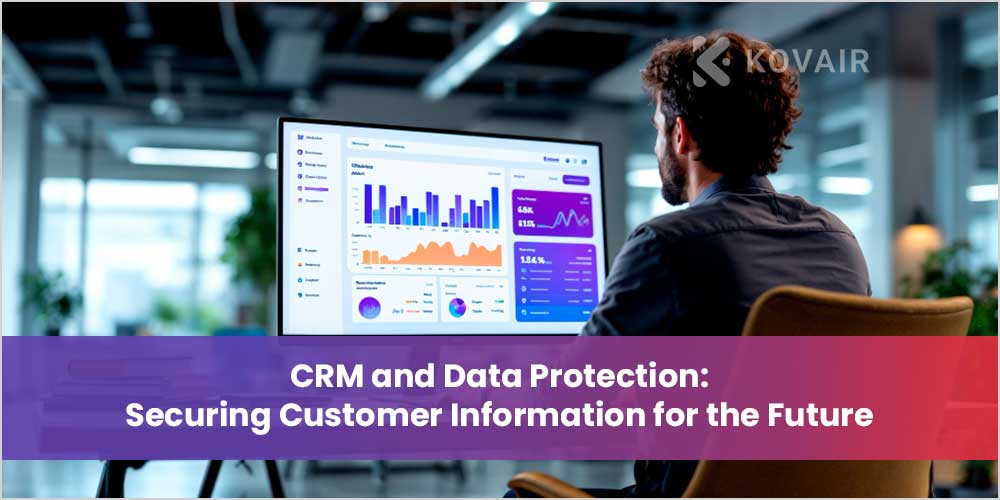
Quick Summary: The customer relationship management market across the globe was worth USD 101.41 billion in 2024 and is estimated to reach USD 262.74 billion by 2032 at a compound annual growth rate (CAGR) of 12.8% over the whole period. North America held the largest position in the customer relationship management market in 2024 and contributed 32.3% to the entire market share.
In the current digital world, for most companies the consumer data is the most essential resource. To be able to perform better in customer experience, sales and marketing functions, companies depend on Customer Relationship Management solutions to collect, manage and analyze the data. But with such a power comes a tremendous responsibility: keeping customer data secure has become more crucial than ever.
The future of CRM does depend on the manner businesses integrate data protection into their systems and practices, as cyber threats become more sophisticated and privacy regulations get stricter.
The Role of CRM in Modern Business
The CRM platforms have evolved beyond mere contact databases. They now function as a central hub for managing every aspect of businesses, from lead generation to after-sales support. By consolidating information across touchpoints, CRMs enable businesses to:
- Enhanced personalized marketing and communication
- Improves customer satisfaction and loyalty
- Forecast sales and trends
- Enhanced Team Collaboration
However, this centralization also makes CRMs a prime target for cyberattacks. A single breach could destroy sensitive personal and financial data, damaging both brand reputation and customer trust.
Why is CRM Data Security Important?
Customer data security is a crucial aspect for an organisation that keeps vast sensitive data, including personal details like financial statements, family information, personal IDs, and more.
Let’s know some top key security importance.
1. Financial Costs and Reputational Damage
A security monetary loss can be included with fines, legal fees, and remediation efforts. The security data of breach reached $4.88 million in 2024. Even if you agree and comply with everything promptly, customers are still likely to lose trust in businesses that can’t protect customers’ data, which can result in a decline in future business.
2. Legal and Regulatory Compliance
To regulate all the sensitive information of customers, there are numerous policies and regulations to protect the customer data. Failure crm compliance can result in severe legal actions and destroy the reputation of the organisation.
3. Operational Disruptions and Competitive Disadvantage
Any breach in CRM on data security can disrupt the business operations and force systems offline, stopping productivity. In competitive markets, companies with a strong reputation for CRM security often have an advantage over their competitors.
What are the Key Pillars for Robust CRM Cybersecurity?
Protecting CRM systems can’t be limited to only fixing problems. It requires a curative listing and staging approach. Effective cybersecurity relies on having skilled CRM developers who focus on key areas: Workforce, Strategy, Process and Technology.
1. Workforce
Employees are often the strongest defence and weakest link in security. That is why it’s necessary to keep your team in the loop with every step you’re taking.
- Security Awareness Training – Regularly train your staff, not just developers, but also keep tracking their work, like unsafe browsing habits, social engineering tricks.
- Passwords & MFA – Ensure to make strong and unique passwords to protect your systems from cyberattacks and fraud.
- Role-Based Access Control – Limit the access to employees according to their job role such as UI/UX design allows access to Website designing. Limiting access reduces the risk of an account being compromised.
2. Strategy
Cybersecurity is an ongoing cycle of planning, monitoring, and adapting to stay ahead of threats.
- Risk Assessments and Audits – Ensure to regularly check the progress and weaknesses in CRM systems, to fix it before any unforeseen by attacks.
- Compliance and Regulations – Following laws and regulations such as GDPR, CCPA, they aren’t just optional, but they reshape the organization by how sensitively you manage, store and share customer information.
- Data Minimization and Retention – Ensure to collect data which are necessary for your business requirements, because storing unnecessary data in your CRM systems is just an extra risk waiting to be exploited.
3. Process
Strong processes ensure consistency and fast responses when threats arise.
- Regular Data Backups and Recovery Testing – Backups are great but they are useless if they don’t work. Automate them and test your recovery so you can always stay on guard.
- Continuous Logging and Monitoring – Continuous monitoring and logging can be beneficial for systems that help you identify unusual behaviour, such as repeated failed logins, before it escalates into a disaster.
- Change Management – Even minor adjustments to your CRM settings can lead to significant security vulnerabilities if not properly made. Document all changes, keep testing the systems before and after rollout and maintain a clear audit trail.
4. Technology
The right tech stack strengthens and keeps threats away.
- Data Encryption – Encrypt sensitive data both in transit and at rest to keep it unreachable if intercepted.
- Two Factor Authentication – Add a proper layer of two-factor authentication or more layered authentication to keep data protected from attacks.
- AI and Machine Learning – AI and machine learning allow us to access unusual activity in advance, forecast risk, and accelerate threat response beyond human capabilities.
Conclusion
While customers get more and more demanding, the use of social networks has made consumer relationships very important and CRM systems are considered one of the best means to build and manage such relationships. Data protection can still not be considered an afterthought; it’s a corollary. Customer data protection not only provides the company with a good image but also improves the level of confidence and loyalty among customers. Companies can strengthen their CRM strategies by implementing security measures, privacy regulation compliance, and the use of advanced technologies such as encryption and AI-based monitoring. In the digital era, customer data protection is not only a matter of legal requirements; it is a way of gaining trust, creating openness, and achieving longevity in business.



